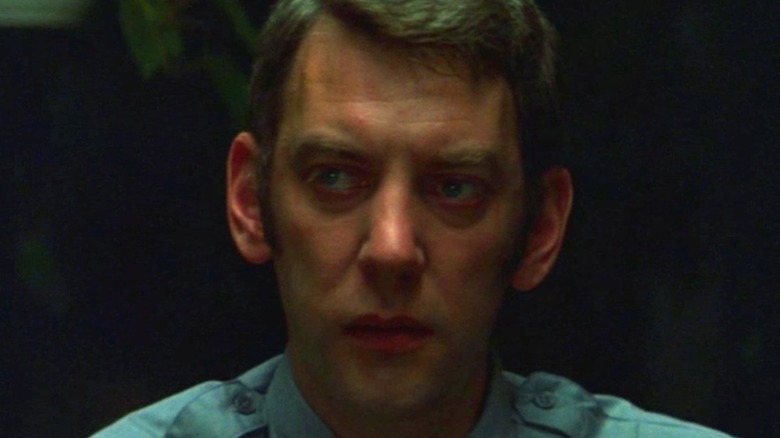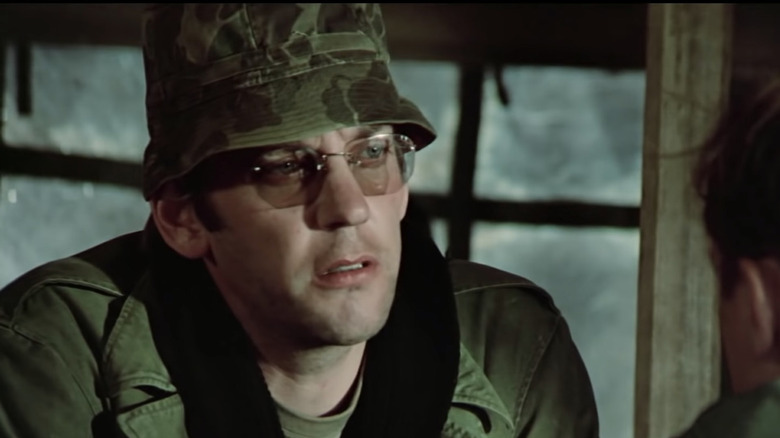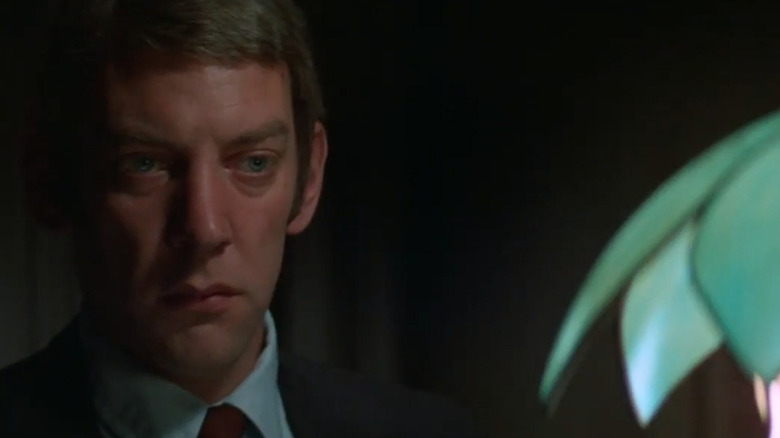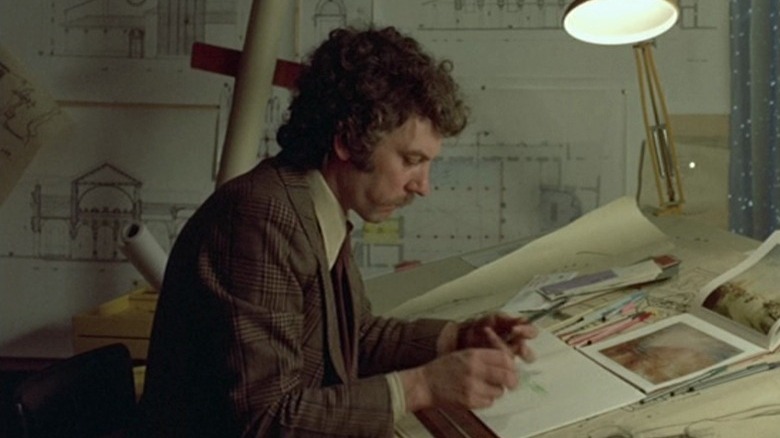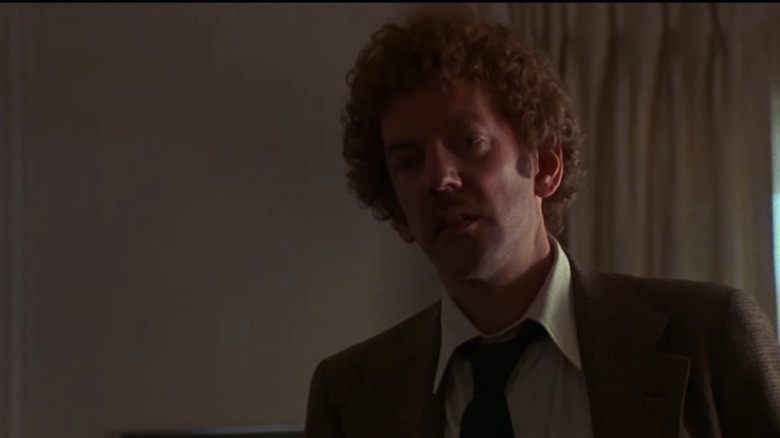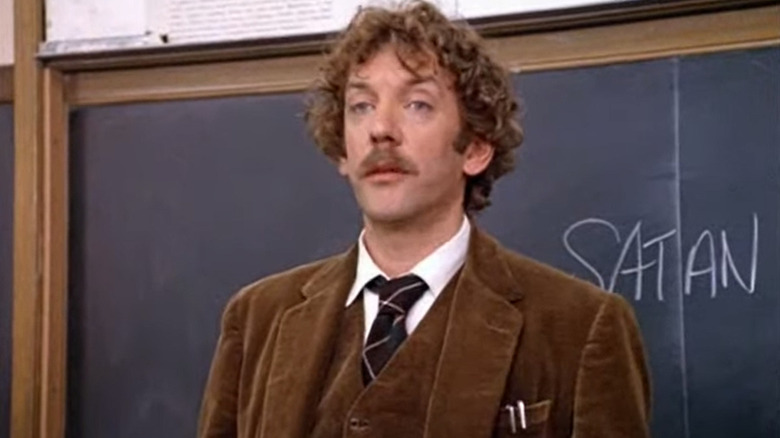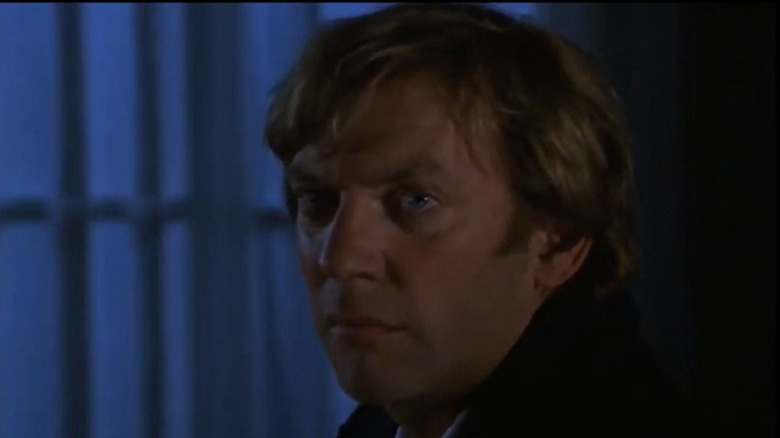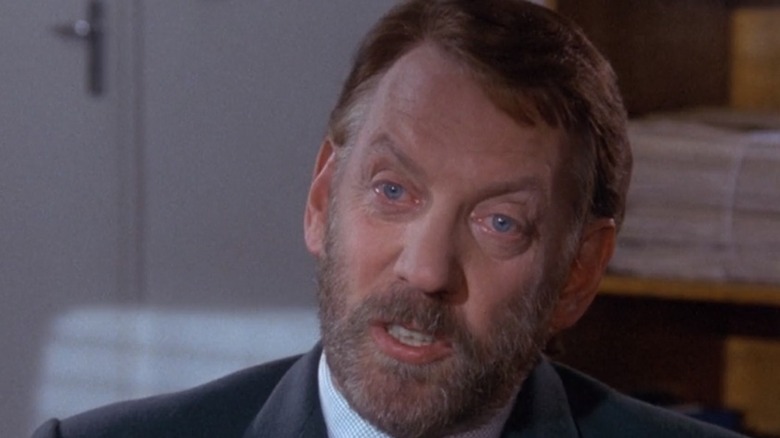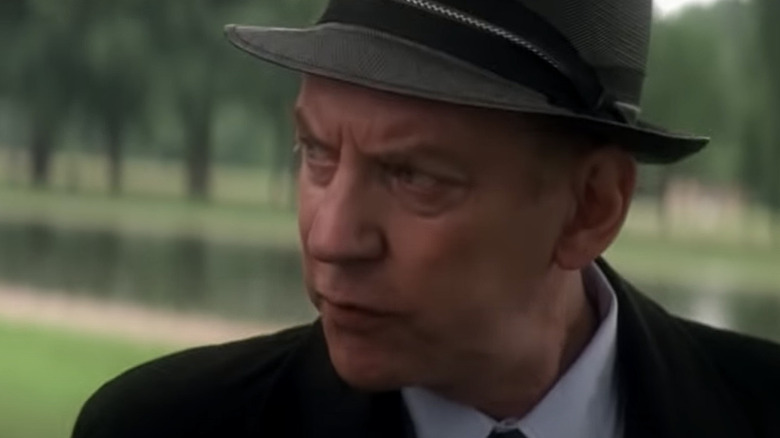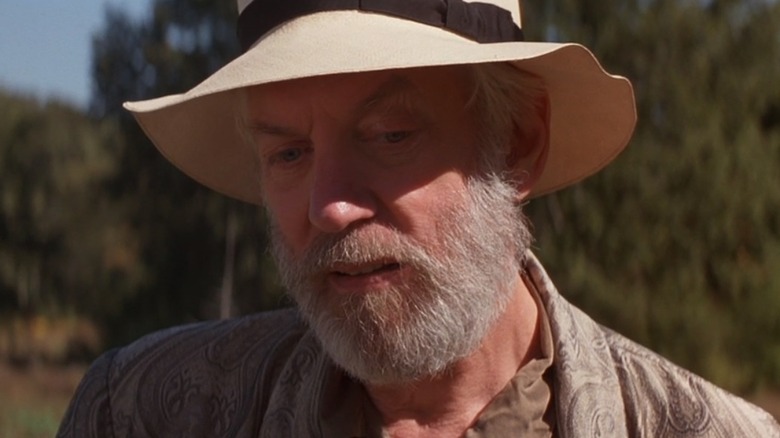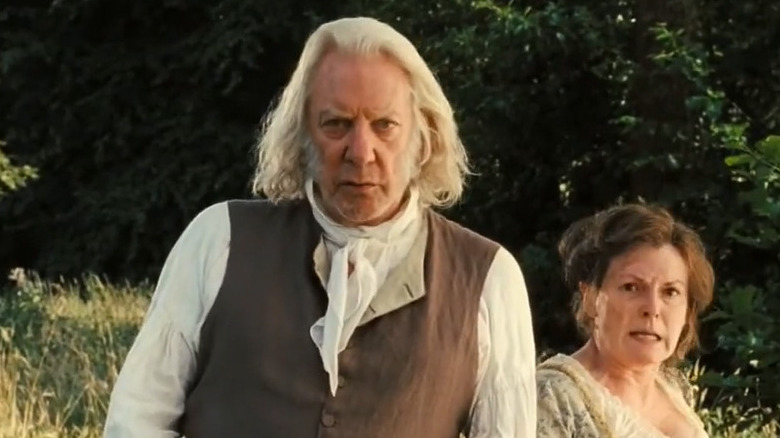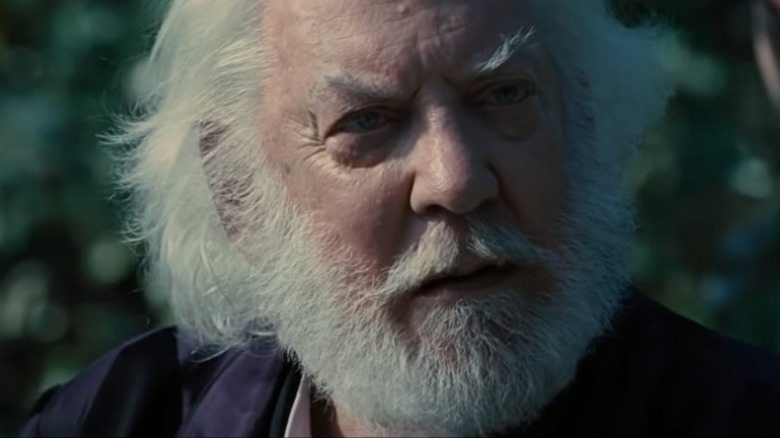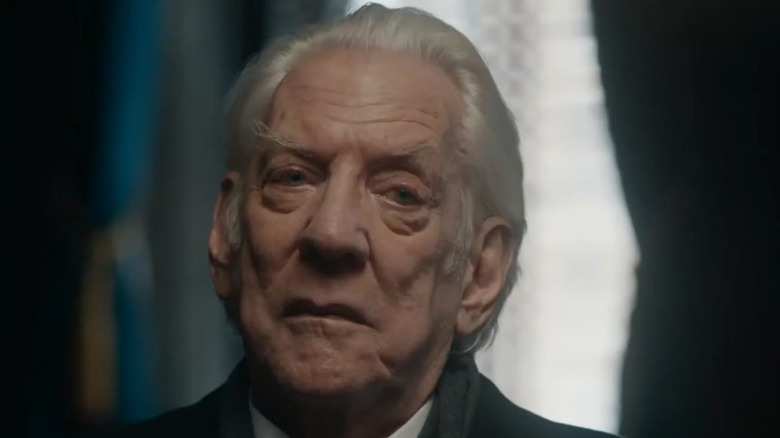Donald Sutherland's Best Movie And TV Roles
Hero or villain, supporting role or leading man, comedy or drama, Donald Sutherland can do it all. The talented Canadian actor has appeared in some of the greatest films of the last 50+ years, and yet he has never once taken home an Academy Award. In fact, he has never even been nominated for one, which even the Academy realized was a mistake when they gave him an honorary Oscar in 2017. His acceptance speech for that award alone shows how charming, funny, and professional the man is.
Sutherland may be in his 80s, but it's clear that he is not slowing down, and he continues to deliver powerhouse performances regularly in film and TV. We'll be looking at 12 of his best roles, but don't fret if your favorite doesn't make it. The truth is that pretty much every role of his career is memorable. Let's take a look at some of Donald Sutherland's best movie and TV roles.
M*A*S*H
When people hear the name Hawkeye Pierce today, they'll most likely think of Alan Alda, which makes sense, seeing as how Alda played the role of the military doctor for 11 seasons. However, before Alda played the part on "M*A*S*H" the show, Donald Sutherland played Hawkeye in "M*A*S*H" the movie.
It's fair to say that the Robert Altman-directed comedy hasn't exactly aged well. While the general anti-war sentiment that carried over to the TV show still rings true for many today, the misogyny is pretty blatant. A lot of the humor relies on treating women badly, like exposing them in the shower or recording them while being intimate. That said, the performances in the film are still quite good, as the cast includes Robert Duvall, Elliott Gould, and Sally Kellerman. Sutherland is particularly great as Hawkeye, a man who is clearly a talented surgeon but who would rather be anywhere else. It may have taken Alan Alda's Hawkeye 11 years to get out of Korea, but Sutherland manages to leave by the end of the movie when his character is discharged. He's nothing if not efficient.
Klute
Donald Sutherland was, essentially, the perfect 1970s leading man. Gone were the days of traditional heroes and villains in Old Hollywood, and New Hollywood needed a new kind of hero. Sutherland's heroes were intelligent, introspective, and flawed but still inherently good men. One of the roles that really made him a New Hollywood star was the role of John Klute in the 1971 thriller "Klute."
Jane Fonda portrays Bree Daniels, a sex worker who is being targeted by a murderer, and private detective John Klute is called in to investigate. Even though they come from wildly different backgrounds and occupations, the two develop feelings for one another as the movie progresses. Many of Sutherland's characters are methodical and thoughtful, and he can say a whole lot without saying much at all. John Klute is one of his quietest roles, and perhaps that's why he didn't receive an Oscar nomination here, compared to the much showier (and equally deserving) Fonda. Regardless, his decade of brilliant performances was just getting started.
Don't Look Now
"Don't Look Now" is not an easy film to watch, and it may take a second viewing to understand fully, but it is worth the investment. Nicholas Roeg's 1973 thriller is, first and foremost, a study of grief. Donald Sutherland and Julie Christie play John and Christine Baxter, a married couple who are mourning the loss of their young daughter, who died in a drowning accident.
The film takes place in Venice, where John and Christine encounter all kinds of bizarre things, both natural and supernatural. Although it may not seem like a horror film at first, "Don't Look Now" is deeply unsettling, and it will get under your skin. It is clear that John and Christine once had a happy marriage, but now they wander around like ghosts, seeing their daughter everywhere. Sutherland and Christie are both brilliant, and they have moments of silence that say everything.
The Baxters are told that their daughter wants to reach them, and John has what seem to be visions, but nothing really makes sense until the film's final moments. When it all comes together, it makes for an ending that you will never forget.
Invasion of the Body Snatchers
While almost everyone agrees that there are too many remakes these days, they are anything but a new trend. In fact, there are plenty of remakes that are better than the original, and the late '70s and '80s gave us a good run of them in the horror genre — "The Thing," "The Fly," "The Blob," and "Invasion of the Body Snatchers." The '50s "Body Snatchers" is a great sci-fi horror film that is nothing like the campy B-movie material that its title suggests. Instead, the film is about the paranoia that everyone was feeling in the '50s due to McCarthyism.
Of course, Americans were subject to all kinds of distrust and paranoia in the '70s as well, including Watergate and Vietnam, so a movie about never knowing when to trust your neighbor was still apt. Sutherland plays Matthew Bennell, who uncovers the conspiracy that aliens are coming to earth and replacing humans with "pod people." Bennell is a great protagonist, as he's smart and keeps everyone calm as the world is falling apart around them. We always feel safe as long as he hasn't been turned into a pod person, which makes the film's final scene one of the most terrifying in horror history. Sutherland's face in the final scene has been inspiring nightmares for 40+ years.
Animal House
In the same year that Donald Sutherland was trying to save the world from the pod people in "Invasion of the Body Snatchers," he also cameoed in "Animal House," one of the most iconic comedy films of all time. His part in the actual film, that of the laid-back professor Dave Jennings, may be a relatively small one, but his part in the production of the film was quite significant.
In a 2014 interview with Variety, Sutherland and director John Landis looked back on their time making the film. The two had met on the set of the 1970 film "Kelly's Heroes," and Sutherland had already cameoed in the Landis-directed "The Kentucky Fried Movie." "Animal House" is a classic today, but it wouldn't have been made without Sutherland. Landis said, "The only movie star I knew was Donald. And because he said yes, that's why we got a green light."
When we first meet Jennings, he's the professor we all wish we had, as he outright admits to finding John Milton's "Paradise Lost" pretty boring and unfunny. Of course, there's a good bit of foreshadowing with Jennings standing in front of a board that says "Satan," as he later reveals himself not to be as likable as he comes across in this scene.
Ordinary People
See if this one sounds familiar. Donald Sutherland plays a man who is trying to get through life following the death of his child in a drowning accident. Strangely enough, this could be the description of either "Don't Look Now" or "Ordinary People," but that is decidedly where the comparisons end.
To some, "Ordinary People" is just "that film that beat 'Raging Bull' for Best Picture," which is a shame because it really is a great film in its own right. What many may expect to be a sentimental or sappy family film is a meaningful and emotional look at grief. Sutherland portrays Calvin Jarrett, who has trouble connecting with his wife, Beth, and their son, Conrad, following the death of their other son, Buck. Conrad has attempted suicide, and he continues to struggle all throughout the film.
By the end of the film, Calvin realizes his marriage is over, as Beth's true colors have come out. Calvin is a nice guy, but he is not a pushover, and he can no longer take Beth's treatment of their son. The monolog in which he tells her, "We would have been alright if there hadn't been any mess," and eventually admitting that he's not sure if he loves her, is one of the finest moments of Sutherland's entire career.
A Dry White Season
Even as Marlon Brando's career was waning, it was clear that actors would give anything to star alongside the legend in a movie. One of his final great performances came in the 1989 film "A Dry White Season." The film stars Donald Sutherland as Ben du Toit, a South African who starts to realize just how bad things are under Apartheid, and Brando plays his attorney, Ian McKenzie.
Like in his '70s films, Sutherland carries the film brilliantly, as we see just how committed his character is to finding the truth, but also how over his head he is. However, it's his scenes with Brando that keep us glued to the screen, as we get to see two of the greatest actors of all time going at it. In a 1990 interview with Terry Wogan, Sutherland talked about his time working with Brando, pointing out that the opportunity to work with him was one of the reasons he signed onto the film. Brando was considered a difficult actor to work with by many, but Sutherland's experience with him was quite the opposite, as he called him, "the most captivating, charming, intelligent, witty man you'd ever hope to meet." In fact, Brando charmed Sutherland's wife, Francine Racette, over the phone so much that she flew out to London to meet him.
JFK
Movies like "Don't Look Now" and "Invasion of the Body Snatchers" proved that Sutherland was a great leading man, but if you want a snapshot of why Sutherland is one of the finest actors of his generation, you need to look no further than his single scene in "JFK."
Oliver Stone's "JFK" has always been a controversial film, seeing as how it plays fast and loose with the facts about Kennedy's assassination, but it undeniably features some stellar acting. It stars a parade of A-list talent, including Kevin Costner, Sissy Spacek, Gary Oldman, Tommy Lee Jones, Joe Pesci, and many more, but it's Sutherland who delivers the most memorable performance. His character only goes by "X," and he merely delivers exposition, but we hang on to every word he says. The brilliant score and editing play a big part, but it would be compelling even if the scene merely consisted of a close-up of Sutherland as he monologs.
Of course, despite the fact that Sutherland is on screen for no more than 15 minutes, his character does help turn the entire investigation around. Sutherland had given memorable roles in films about mistrust and conspiracy, so it only makes sense that he now plays the wise master who knows all about the conspiracy. Even if you don't watch all 3+ hours of "JFK," you can watch his scene and be fully captivated.
A Time to Kill
Starting with "The Firm" in 1993, there was a run of John Grisham adaptations in the 1990s and early 2000s that always starred a loaded cast of megastars. Some of them, like "The Rainmaker," were quite good. Others, like "The Chamber," were critical disasters. The 1996 film "A Time to Kill," an adaptation of Grisham's first novel, fell somewhere in the middle.
The book, which is one of Grisham's longest, is not an easy one to adapt. Matthew McConaughey plays Jake Brigance, who defends Carl Lee Hailey (Samuel L. Jackson), following an act of vigilantism. Their performances are solid, but Donald Sutherland's portrayal of Lucien Wilbanks feels lifted right from the pages of the novel. Lucien is a good man with deep flaws who serves as a mentor to Brigance.
In just his introductory scene, we see his whole character in a matter of seconds — the sadness in his eyes, the alcoholism that made his life fall apart, the pride he takes in Jake, and the love of the law that he still has deep down. Like in "JFK," Sutherland proves that no matter the size of the role, he will always steal the movie.
Pride & Prejudice
Continuing in his trend of perfectly adapting literary characters to the big screen, Sutherland played the lovably snarky Mr. Bennet in the 2005 film "Pride & Prejudice." Despite "Pride and Prejudice" being one of the most beloved novels in all of British literature, as well as the fact that he is surrounded by British actors, the Canadian actor is perfect in the iconic role.
Sutherland is incredibly charming as the patriarch, and he brings the same introspective understanding that we saw in "Ordinary People" 25 years prior. Mr. Bennet clearly has a similar personality to his daughter, Elizabeth, meaning he can understand her better than anyone else can. In the famous scene where Elizabeth's mother expects her to marry Mr. Collins, we see her father using his trademark wit. Despite the fact that their financial wellbeing is on the line, he still goes through it all with a smile and wants his daughter to marry for love, not money. There's that great sheepish twinkle in his eye that only Sutherland can deliver.
The Hunger Games
He can play heroes, anti-heroes, and smarmy jerks, but "The Hunger Games" sees Donald Sutherland playing an outright depraved villain. The film series, based on the Suzanne Collins book series of the same name, gave a boost to the careers of Jennifer Lawrence, Liam Hemsworth, and Josh Hutcherson, but it also featured an impressive cast of established actors. Stars like Woody Harrelson, Elizabeth Banks, and Wes Bentley were pitch-perfect in their respective roles, but it was Sutherland as President Coriolanus Snow who left the biggest impression.
President Snow stays in the background of the first book, but we get to see him front and center from the first movie on, and Sutherland brings a quiet intensity to the role. He is clearly evil, but he can put on such a charming façade that we understand why people buy what he's selling.
The titular Hunger Games exist to keep the citizens of this post-apocalyptic America in line, and in one of the most memorable scenes from the first film, President Snow lays it all out to Seneca Crane (Bentley), the designer of that year's games. When the games are not going as planned, and Katniss Everdeen (Lawrence) is drawing up support for a rebellion, Snow asks Crane, "Why do we have a winner?" He proceeds to explain that he wants to give his citizens some hope, but not enough that they will ever rebel. It's a fascinating look at absolute power.
The Undoing
The HBO miniseries "The Undoing" was quite popular when it aired in 2020, but the actual resolution to the central mystery turned out to be pretty underwhelming. The show spent a lot of time chasing pointless red herrings and delving into unnecessary subplots, but the performances were fantastic. Sutherland portrayed Franklin Reinhardt, the father of protagonist Grace Fraser (Nicole Kidman).
Franklin's character was a loving father and grandfather who would stop at nothing to make sure his family was safe. Of course, since an A-list star like Sutherland was lurking in the supporting cast, he served as a reasonable red herring, despite the fact that his character would have had no motivation to commit the murder. His most memorable scene came when he met with an employee of his grandson's expensive school and used an NSFW compound word that he somehow made sound classy and refined. You have to see it to believe it, because it's the kind of thing only Sutherland could pull off. He may now be in the seventh decade of his acting career, but the man clearly still has some great performances left in him.
